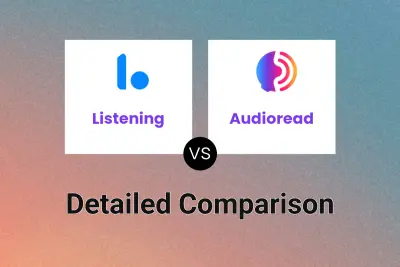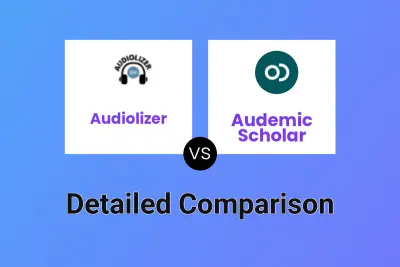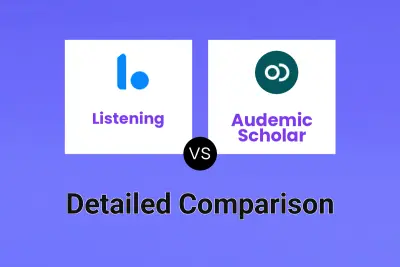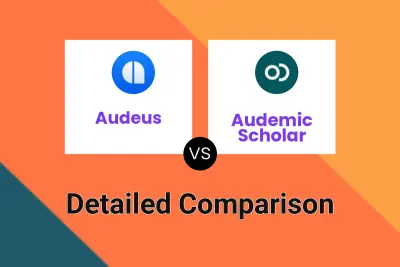 Listening
VS
Listening
VS
 Audemic Scholar
Audemic Scholar
Listening
Listening is an AI-powered application designed to convert academic papers, documents, and other text-based materials into natural-sounding audio. It utilizes advanced artificial intelligence to generate voices that closely resemble human speech, enabling users to listen to content instead of reading it. The platform supports a wide range of input formats, including PDF files, Word documents, MOBI, EPUB, pasted text, website URLs, and scanned physical pages, accessible through mobile apps and a Chrome extension.
This tool helps users, particularly students and researchers, save time and absorb information more effectively by allowing them to listen while engaging in other activities like commuting, exercising, or household chores. Key features include adjustable playback speed (up to 3x), the ability to select specific sections for listening, and automatic skipping of citations, references, and footnotes. Additionally, Listening offers a unique one-click note-taking function that captures recently heard audio segments, enhancing study and research workflows.
Audemic Scholar
Audemic Scholar assists Ph.D. students and researchers by transforming academic papers into listenable audio formats. Users can upload PDF documents or import them from reference managers. The tool utilizes neural text-to-speech technology to provide natural-sounding audio versions of the full text or key statements, reducing reliance on robotic voices. It also offers translation features, currently supporting English to Spanish, to overcome language barriers in scientific communication.
Beyond audio conversion, Audemic Scholar provides features designed for enhanced productivity and accessibility. It includes tools for highlighting and note-taking directly within the platform, helping users organize their research effectively. The platform supports immersion reading, highlighting text as it's read aloud. Accessibility options like adjustable playback speed, various background colors, and a dyslexic-friendly font cater to diverse reading needs and preferences, including those with visual impairments, ADHD, or dyslexia. The service is accessible across multiple devices, including a companion mobile app for seamless syncing.
Pricing
Listening Pricing
Listening offers Free Trial pricing .
Audemic Scholar Pricing
Audemic Scholar offers Free Trial pricing with plans starting from $20 per month .
Features
Listening
- AI-Powered Narration: Converts text to audio with natural-sounding AI voices.
- Multi-Format Support: Accepts PDFs, Word Docs, MOBI, EPUB, pasted text, website URLs, and scanned pages.
- Selective Listening: Allows users to choose specific sections of a paper to listen to.
- Automatic Skipping: Intelligently skips citations, references, and footnotes during playback.
- Adjustable Playback Speed: Control listening speed from 0.75x up to 3x.
- One-Click Note Taking: Captures the last heard sentences with a single click, auto-timestamped.
- Cross-Platform Access: Available via iOS app, Android app, and Chrome Extension.
- Multiple Voice Options: Choose from different AI narrator voices.
Audemic Scholar
- PDF to Audio Conversion: Upload or import academic PDFs and listen using neural text-to-speech voices.
- Selective Listening: Choose between listening to the full text or key statements.
- Highlighting & Note-Taking: Annotate papers directly within the tool and organize research.
- Immersion Reading: Follow along as the text is highlighted while being read aloud.
- Translation: Translate papers from English to Spanish (more languages planned).
- Accessibility Features: Includes adjustable speed, background colors, dyslexic font, and section ordering.
- Multi-Device Sync: Access and sync papers across web and mobile apps (iOS/Android).
- Reference Manager Integration: Import papers directly from reference managers.
Use Cases
Listening Use Cases
- Listening to academic research papers while commuting or traveling.
- Consuming study materials during exercise, cooking, or chores.
- Accelerating literature reviews by listening at higher speeds.
- Assisting individuals with dyslexia or visual impairments in accessing text content.
- Taking audio notes from research papers efficiently.
- Preparing for academic discussions by listening to relevant articles.
- Converting lengthy documents or textbooks into audio format for easier digestion.
Audemic Scholar Use Cases
- Speeding up literature review for researchers and students.
- Improving comprehension of complex academic papers.
- Accessing research papers while commuting, exercising, or resting.
- Assisting researchers with visual impairments, dyslexia, or ADHD.
- Helping non-native English speakers understand English research papers.
- Organizing research notes and highlights in one central location.
FAQs
Listening FAQs
-
Can Listening pronounce complex academic or scientific terms accurately?
Yes, Listening is designed to handle difficult terminology found in academic papers and provides good pronunciation, including for niche or scientific words. Users can also report rare mispronunciations. -
Is it possible to listen to only specific parts of a document, like the abstract or results?
Yes, the application allows you to select specific sections of a paper for listening, enabling you to focus on parts like the abstract or results if desired. -
Does the app read out citations, references, or footnotes?
No, Listening automatically skips inline citations, footnotes, and reference sections during playback to provide a smoother listening experience focused on the main content.
Audemic Scholar FAQs
-
What types of files does Audemic Scholar support?
Audemic Scholar supports PDF files of research papers. -
Is there a mobile app available?
Yes, the Audemic Scholar mobile app is available for both iPhone and Android devices for users during their 7-day free trial and for Premium subscribers. It syncs with the web application. -
Can I search for academic papers directly within Audemic Scholar?
Currently, you cannot search for papers directly within the platform, but this functionality is planned for future development. -
How can users provide feedback or request new features?
Users can suggest features via the Product Road site, email contact@audemic.io, or tag Audemic on social media channels like LinkedIn, Instagram, TikTok, or X. -
What accessibility features does Audemic Scholar offer?
Audemic Scholar includes features like adjustable audio playback speed, multiple background color options, section reordering, immersion reading, and a dyslexic-friendly font to support users with different reading needs, including visual impairment, ADHD, and dyslexia.
Listening
Audemic Scholar
More Comparisons:
-

Listening vs Audioread Detailed comparison features, price
ComparisonView details → -

Audiolizer vs Audemic Scholar Detailed comparison features, price
ComparisonView details → -

Listening vs Audemic Scholar Detailed comparison features, price
ComparisonView details → -

Audeus vs Audemic Scholar Detailed comparison features, price
ComparisonView details →
Didn't find tool you were looking for?